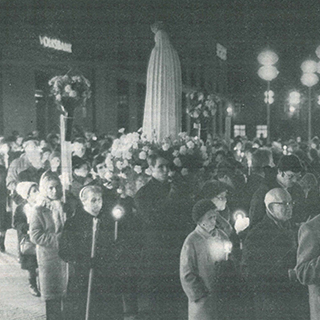B.2.2 | “The lords of the world would like that, wouldn’t they …“.
Sacro-pop as social and church criticism by young Catholics
“The lords of the world would like that, wouldn’t they, if justice came only after death, if only then the rule of the lords, if only then the bondage of servants were forgotten forever ... Yet the liberator has risen from the dead …. and now calls us all to a resurrection on earth, to rise up against the lords, who rule us with death.” (‘Anderes Osterlied’ [Alternative Easter Hymn]; Text: Kurt Marti, Music: Peter Janssens) Semantics: The savior becomes a liberator, the resurrection an insurrection. Practices: It was this song (among others) that turned the highest feast of Christianity into a protest ‘happening.’ Emotions: Singing this song brought on an anti-establishment feeling.
The clash of generations after ‘1968’ was carried out in the field of music, too. Many adults of the time were still influenced by earlier racist denunciations of jazz as ‘negro music,’ while rock and pop were considered ‘inappropriate’ for the liturgy, a form of ‘Americanization’ that threatened religion and culture. Music was therefore a prime medium of protest and provocation.
For youths and young adults, sacro-pop musicals and the ‘new spiritual song’ (‘Neues geistliches Lied’ or NGL) acquired a central, Catholic-boundaries-bursting importance. In a provocative way, they linked key tropes of traditional religious language with contemporary political themes: peace, global justice, ecology, sexuality. Sacro-pop put its stamp on the group culture of BDKJ (League of German Catholic Youth) associations, the peace and environmental movements, as well as acts of solidarity informed by liberation theology.
This sub-project shows the dynamic of conflict with which rituals were able to mobilize new supporter groups and how frequently this was repelled. The opponents of sacro-pop formed a massed front of rejection and denunciation. They defended the values of the liturgical movement of the 1920s to 1950s, as well as their own self-image of having asserted themselves against Hitler and having helped achieve West German reconstruction. By contrast, sacro-pop helped integrate those who, with the wind of Vatican II at their backs, tackled the residual problems of the Federal Republic.


